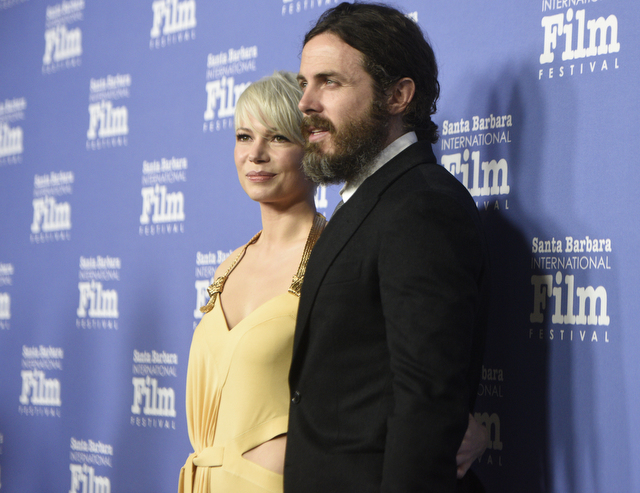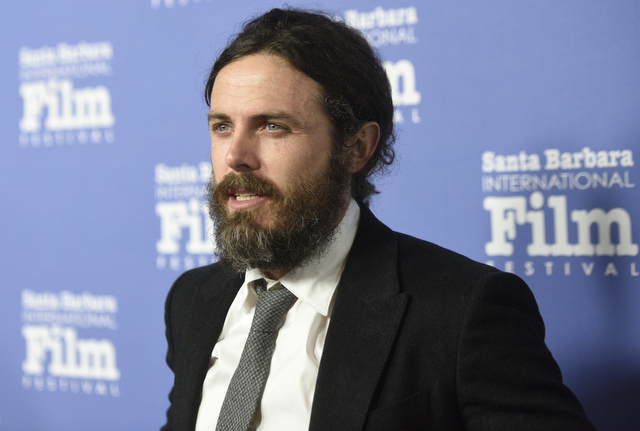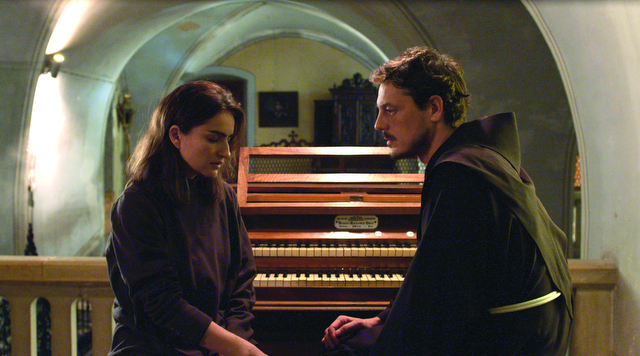SBIFF: Day 5
Affleck, Williams by Another Sea

Memories inevitably double-back and cross-reference in the minds of habitual SBIFF-goers over the years, the now 32 year history of which is a vast and slowly growing tapestry of experiences in our rich little town. A few years back, Ben Affleck — then-recently anointed as a director of no small gifts — was given a tribute night at the Arlington, and he acquitted himself with suavity and charming ease.

His brother Casey is a brother of another character, a certain introspective nature that resists spotlight and show biz glitz — and undoubtedly feeds into his understated but masterful acting. Nobody expected him to spring to life, Hollywood style at last night’s Arlington “Cinema Vanguard” tribute, also a nod to his Manchester by the Sea co-star, the marvel Michelle Williams, and he delivered on those expectations, as he suffered through two things he doesn’t like to do (according to Manchester writer-director Kenneth Lonergan — talk about his work or watch his work.
But no matter: What Affleck has brought to his art requires no further explanation or show biz tap-dancing. As we’ve seen in just a few choice roles over the last decade — The Assassination of Jesse James, in which he played “Coward” Robert Ford, Gone Baby Gone (directed by his brother), and especially his masterpiece so far, Manchester by the Sea, possibly the greatest and most mesmerizingly subtle, human — and yes, sad — American film of 2016.
As Affleck told the audience, the SBIFF toast was a kind of personal final touch for this group, this project, the end of a dizzying adventure of appreciation and critical hosannas that began with the film’s auspicious premiere at last year’s Sundance, and a rising tide of success on every level, capped off by high marks in the awards season, including the Oscar sweepstakes. Affleck had unending praises for Lonergan this night: “There have been a lot of complaints about the crassness of Hollywood. It’s great to see a story well-told…which honors and dignifies the life of the everyday person. I think that’s what people are responding to.”

Williams, too, has had a few tasty and refreshingly offbeat roles in her resume, including Wendy and Lucy (and other Kelly Reichardt-directed films), Blue Valentine (with Ryan Gosling, on the Arlington stage two nights earlier) and My Week with Marilyn.
It was great to hear Affleck briefly talk about his directorial debut, the bizarre and underrated jewel of a film, the Joaquin Pheonix faux meltdown mockumentary I’m Still Here. When moderator Scott Foundas mentioned that many didn’t know what to make of the film, Affleck added, “I didn’t know what to make of it,” saying of the uncompromising and enigmatic Pheonix. “I like to be around people who are fully committed to something, and who are different.” One day, this curveball beauty of a film may get its due respect. Or not.
After accepting the Cinema Vanguard award from Lonergan, Williams mentioned that her young daughter was excited for her mother “finally winning one,” and suggested mom console the actresses who didn’t win.
Affleck got haltingly personal, admitting that “I hate the sound of my voice,” and that he has recently realized that his connection to acting goes back to life as a nine-year-old, when his mother took him to “Alateen,” where children of alcoholics (his father was an extreme one) re-enacted home life. “It was like drama and therapy combined,” he said. “Acting has been that for me ever since.” Whatever the secret, this Affleck, now 41, on his way to becoming one of the great practitioners of the art, regardless of his polish or comportment in the press light.
Bluesy Films: It shouldn’t be new by now that the blues — that supposedly bedrock foundation of American music — has root system extending back beyond the Mississippi Delta to the global music hot spot of West Africa, which exported a lot of the music’s elements on slave ships. That in itself is a still-compelling story, but the wondrous new German documentary on Malian music, Mali Blues, only touches briefly on the blues lineage, taking stronger aim at the current and ancient traditions great and influential musical life through the stories of four of the country’s prime artists — the great vocalist Fatoumata Diawara, rapper Master Soumy, contemporary griot Bassekou Kouyate, and Tuareg artist Ahmed Ag Kaedi.

In fact, the real “blues” elements of this story includes tragic conditions in the present day, including radical Islamist’s banning of music in the desert region of Northern Mali, in Timbuktu and the home of the famous “Festival of the Desert” (a clip of which opens the film with a visceral wow factor). Director Lutz Gregor does a stellar job telling their stories, including generous doses of music, allowing beautiful cinematography to paint the picture of the music’s home landscape and — staying out the way, with zero narration interjected into or interrupting the subjects’ testimonials. As a climax, Diawara, who left Mali to pursue her artistic vision and escape repressive circumstances at home, is caught in her triumphant first concert in Mali. “It’s great to be African,” she tells the throng. “It is greater to be a Malian.”
Along with the eye and ear opening John Coltrane doc Chasing Trane, Mali Blues is another superb example of a music doc that matters, informs and moves — enhanced by the experience of catching these films in the glorious Lobero Theatre, itself a super-charged musical room.
Random SBIFF Housekeeping and Field Notes: Out of the mouths of festival programmers…To kick a Monday morning into gear, SBIFF domo Roger Durling bound into the theater where the very fine Dramatic Shorts were screening, saying, “I’ve been serenading all the “Breakfast Club” screening this morning, and will now do this for you.” Enter his heartfelt run through Irving Berlin’s “It’s a Lovely Day” (“Let the rain pitter patter/But it really doesn’t matter/If the skies are gray/Long as I can be with you/It’s a lovely day.”) While introducing Sunday morning’s screening of the most excellent Mali Blues, the festival programmer Michael Albright — who has brightened the festival program with many an impressive music film over many years now, including this year’s Chasing Trane — alluded to the elephant in the room and the potential major distraction of the day: “We want to fight the Super Bowl with great cinema.”

Yesterday afternoon, the organizer of the annual “Kolnoa” sidebar of cinema from Israel, Mashey Bernstein, was talking up the quite fine A Quiet Heart (also a music-related story of sorts, it turns out, about a young woman pianist moving to an Orthodox neighborhood in Jerusalem and braving extremism), and he said, “Outside of the synagogue, the holiest place I know is the cinema.” Of course, he wasn’t only waxing poetic, but using the comment to underscore his proverbial wag of the finger to ixnay audience cell phone usage and other unholy acts. Seriously.



